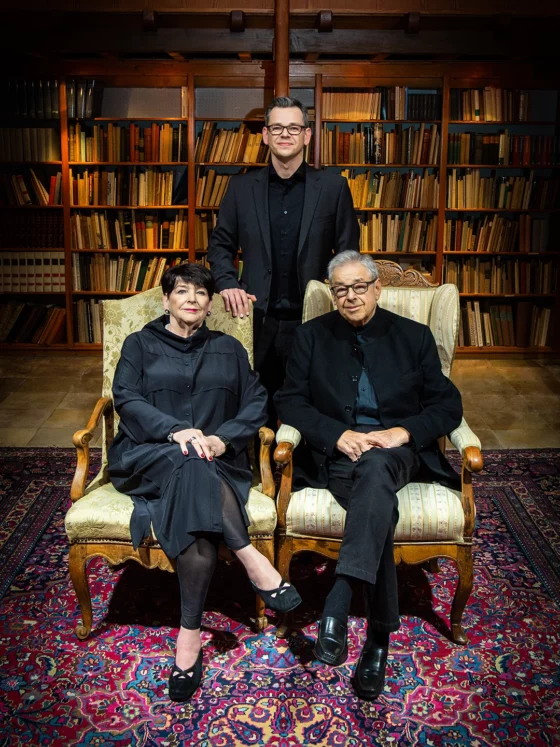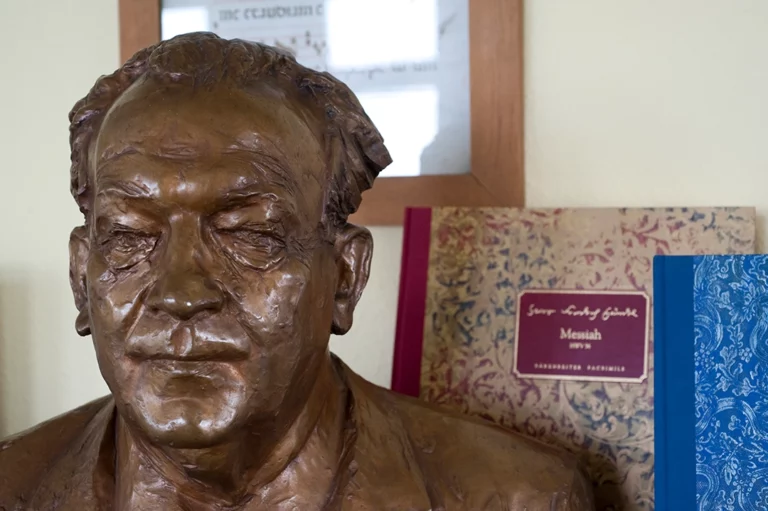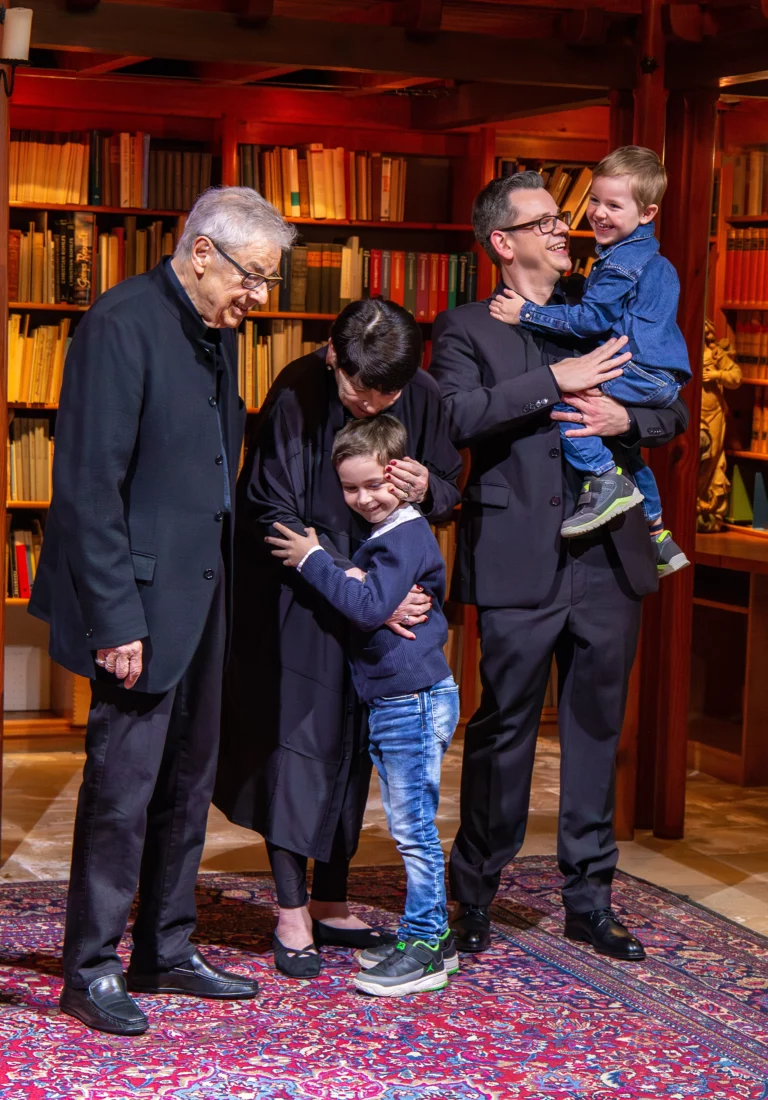Reviewing the past, taking stock, looking to the future
An interview with Bärenreiter managing directors Barbara Scheuch-Vötterle, Leonhard Scheuch and Clemens Scheuch


Bärenreiter is often seen as a “family business” and you refer to it as such. How would you explain what that is to an outsider?
Barbara Scheuch-Vötterle (BSV): As the name suggests, behind this kind of company there is a family, not a CEO who has come from the outside and whose only concerns are growth and making a quick profit. We are most fortunate that our son Clemens is the third generation to steer our publishing house’s fortunes, and we are delighted to see that he – just like us – holds our staff’s interests in high regard. I can safely say that the majority of our workforce feels comfortable and safe in our company. That’s a major advantage these days.
Ms. Scheuch-Vötterle, you worked for Bärenreiter for half of the company’s hundred-year history. What high points do you recall – and what low points?
BSV: The lowest point for me was the painful realisation that a senior employee in whom my father had placed his complete trust for decades – and I had subsequently done so too at first – had abused this trust, and that the publishing house was now in financial difficulties as a result.
The high point of those first years for me was that my husband and I, with significant effort and privation, succeeded in steering Bärenreiter’s ship back on a healthy course.
… and for you?
Leonhard Scheuch (LS): That we were able to pull this off together. I hadn’t known about the situation beforehand and was glad that I became involved gradually. I was always thinking forward.
Do you remember the first time you set foot in Bärenreiter’s premises?
LS: On my first visit here in Kassel, the publishing house did not come into play as yet. I had met Karl Vötterle twice before, and he was naturally very interested in the man with whom his youngest daughter wanted to build a future.
BSV: After our first meeting in Brno in September 1974, I told my mother that I had met a Swiss man there I wanted to marry. Of course, he didn’t have a clue about my plans, but after several meetings in Zurich and Leipzig, it quickly became clear to both of us that we were thinking about a future together.
Due to your father’s illness, you were forced to take on responsibilities at the publishing house sooner than you wanted to. How do you see those years of decision-making today? Were you forced to give anything up at that time?
BSV: When my father fell ill, I broke off my studies in Göttingen to be able to spend the time we had left intensely at his side. I knew that the crucial things I could only learn from him. For me, this didn’t mean giving anything up, but was the right decision.
You grew up in a publisher’s household where there was no separation between business and private matters. Was that normal for you, or did you ever think it would be nice to talk about something else for once?
BSV: The conversations around the family table naturally revolved around issues at Bärenreiter first and foremost. The lines were blurred, many composers, artists and personalities were my parents’ guests, and thus I grew into the publishing business from childhood. But our private lives were not neglected either.
What was that like for you?
Clemens Scheuch (CS): When you’re young, you can’t really fully grasp the profession of music publishing, so I didn’t really understand what the deal was with the people coming and going at Bärenreiter. Nevertheless, for me these encounters were often exciting and sometimes bizarre. And there were also phases when I was not always thrilled to be … allowed … to have to accompany my parents to concerts and performances. However, thanks to our unusual family life, I had a completely different approach and access to the music and publishing sector, and so with time my understanding and enthusiasm for it grew.
After you had met your wife, at some point it was inevitable that you would have to think about your involvement or even non-involvement in the publishing house.
LS: I had never considered such a possibility. But why should I not have the courage to get involved? If I had ventured to pursue a career in theatre, that would have been risky as well.
Nor did the first two meetings with my future wife suggest my changing over to the publishing house.
BSV: After our wedding in 1975, it was a great relief for my father to know that his company’s future would be in family hands. His strength was waning noticeably, and he died only two months later.

Did you find the change from the theatre to a business enterprise challenging?
LS: After my father-in-law’s sudden death, the then director of the Zurich Opera House, Claus Helmut Drese, saw how important my presence in Kassel would be and released me from my contract in the middle of the season as soon as I was able to suggest a successor to him.
What did you start with at Bärenreiter?
LS: My joining the publishing house was viewed with great suspicion by some of the senior staff. One of these gentlemen told me: “A dramaturg, he’s able to write, he can start by editing the journal Musica.” This task, with Carl Dahlhaus on the one hand and the young Clemens Kühn on the other, was extremely interesting. But of course it didn’t stop there. As my wife has already indicated, we had to overcome lots of hurdles together to pull off the restructuring of the publishing house. One very important and trustworthy advisor for us was the publisher Bernhard Bosse, whose publishing house we took over completely and relocated to Kassel following his retirement.
BSV: We first had to get an overview of the economic situation. There were no cost centre accounts, we didn’t know how the technical side of the business was doing taken by itself. So we decided to bring in a management consultancy to uncover the business’s weak points. That was the best we could do in this situation. As a result, in 1987 we divested ourselves of our entire technical operations. For the first ten years, we were really just reorganising and figuring out how to make ends meet. We also let go of everything that didn’t have to do with music: drama, amateur theatre, theology. We wanted to concentrate fully on what we knew well and what the name Bärenreiter stands for.
Was there a point at which you said, “Now we’re out of the woods”?
BSV: That’s hard to pin down to a particular point in time. It was more like little avalanches coming over us.
The connection with Czech music and the country is a thread running through both your lives. How do you explain this?
LS: My father-in-law’s capital for his yet-to-be-founded publishing house was 75 Czech crowns, which he was given by his Wandervogel friends at a singing week in Mährisch Trübau (today’s Moravská Třebová) as an advance on his planned song collection. Throughout his life, he felt close ties to Czech music and the people there. He signed sub-publishing contracts with the state publishers very soon after the War. Many friendships with composers and writers there developed.
I myself studied theatre in Vienna, which was where I saw Janáček’s Jenůfa for the first time. That opera engaged me in a way I had never experienced before, so that everything drew me to Brno to learn more about its composer. I had the great good fortune to be able to live in the Štědroň family home during my stays there. The name Miloš Štědroň is very closely linked with research on Janáček’s work.
My wife was able to accompany her father on many of his trips, including to Brno in 1974 for the annual Janáček Festival. It was there we met for the first time in Litomyšl, Smetana’s birthplace.
After the Velvet Revolution, as the Czechs call the overturning of their socialist dictatorship, our mutual love of the country’s music and its people then provided the impetus for us to participate in the privatisation of the Supraphon publishing house and finally take it over completely.
A publishing house such as Bärenreiter lives predominantly off creations of the past. No 21st-century Mozart is in sight. Is there any future for the division of “new music”?
CS: In recent years, the conditions have changed due to the desire to always have world premieres. But premieres alone are not enough to make a new work sustainable. My impression is that a bubble has been created that is going to burst in the near future, or perhaps even has to burst so we can get out of this dead end. After all, this situation is hardly desirable for the composers either, because the aim is also to spread a work through repeat performances. Fortunately, there are counterexamples, too, such as Dieter Ammann’s piano concerto.
At some point, all the great works of music history that promise market opportunities will be available in Bärenreiter’s catalogue. When that time comes, will Bärenreiter simply administer or, at best, update its past efforts?
CS: “Just updating” sounds less exciting than it is. It can be thrilling when new sources and new ways of looking at a given piece emerge. Preserving and revising is an important task. We also don’t know what changes will take place in the music business – rediscoveries, for example, which we can then support or, in the best case, even help to initiate, as we did with Handel. It is certain, however, that our focus will always be on older music, not new music.
LS: When the major complete works editions were finished or their edition process was nearing its end, I did sometimes wonder whether there was anything left to come. But there are still important composers whose works have yet to receive scholarly treatment in a complete or collected edition. Many impulses came from our editors’ collaborations with musicologists. Other new opportunities opened up through our Prague publishing house.
CS: There are still enough exciting fields to be discovered or rediscovered. Or other approaches can be successful, too, such as Michael Ostrzyga’s completion of Mozart’s Requiem; it is already one of our most-requested new releases of recent years. We will have enough to do with maintaining, revising and constantly scrutinising our portfolio, so that I don’t see any danger of us running out of things to do in the years and decades to come.

“Digitisation” is now a major buzzword everywhere. How far can a music publisher go without cutting the ground from under its own feet?
CS: In terms of work processes, digitisation has made things far easier and simpler. Digitisation in distribution channels poses risks, although these are not new, because there has always been the danger of works we have published circulating without us being able to profit from them. Unauthorised copying is easier today, but it is also easier to counter and to educate clients about it.
We will have to keep a close eye on which forms of use become established. I don’t think that the paper-based business will disappear anytime soon, but rather that today the digital use of sheet music is another way for musicians and musicologists to find the right tool for their given situation. Even among younger musicians, we can observe that they often use printed music for serious study and performances.
We cannot yet fully predict what will happen when digitisation spreads to creative endeavours. But here, too, I see technology more as a tool, because even the most sophisticated digital technology or artificial intelligence is unable to do anything more than analyse and recombine things that already exist. Nothing original is produced of its own. What I believe is the crucial input of creative work, the emotional level, is not something that artificial intelligence can add.
In 2048 Bärenreiter will – hopefully! – celebrate its 125th anniversary. If you extrapolate its development from the time you have been active at the publishing house: what might Bärenreiter look like then?
CS: I don’t think the publishing house will differ too much from today in terms of content. The ways this content is used will certainly be different, and in the next 25 years additional things will appear that we can’t even imagine now – more individualised offerings, for example.
It is also likely that Germany’s broad – state-supported – cultural range will no longer exist in the same way. Current developments in the United Kingdom can certainly be seen as a harbinger of what is to come here. But at its core, the business will be the same. The focus will be on preparing and editing the works that composers have left behind in such a way that musicians are given the best possible foundation for their interpretation.
Classical music must never be allowed to become something elitist just for the older generations and the well-off, something that young people no longer want to engage with because they have not been able to access it. The crucial question is how to introduce young people to music and culture. The earlier their interest is aroused, the greater it can grow. For me, the best moments are when I succeed in inspiring a passion for music in people. If the basic conditions are met, I have no doubts that classical music has a future.
You’re alone on the proverbial desert island, but with a stereo. You’re allowed take a recording of the complete works of a single composer. Who would you choose?
LS: No question: Leoš Janáček.
BSV: Tricky … There are moments when I listen to Mozart or Schubert. But if there can only be one, then George Frideric Handel.
CS: If I had to choose just one, it would probably be Beethoven.
The interview was conducted by Johannes Mundry on 3 April 2023.